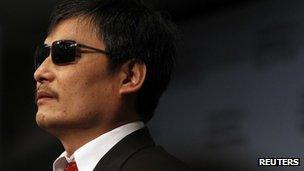Chinese look to US as Beijing seeks to build soft power
- Published

Last year the US government processed one million visas in China and this year it expects to approve many more
At the US embassy in Beijing on any given weekday, hundreds of Chinese people mill around clutching sheaves of papers and wearing excited smiles.
They are there to apply for visas to visit America - to work, to study and to travel.
The desire to go to the United States is just one of any number of symbols that reveals the country's enduring appeal to foreigners.
China's leaders want their own country to be seen in a similar light - and have spent billions of dollars to project the right image.
But a number of recent incidents - the flight of a blind activist to the States being just one - seem to have undermined those efforts.
Some think a country that locks up people for speaking their mind will always struggle to generate the right kind of image abroad.
"I don't think we know how to speak and create soft power for the international community," said Hung Huang, the editor of lifestyle magazine iLook.
She said the country's leaders often adopted a patronising or a bullying attitude, neither of which endears them to foreigners.
'Always happy'
Any Chinese leader who wants to know how to build up the country's soft power could do worse than visit the US embassy.
Chinese people applying for US visas are happy to talk about America's appeal.

Mr Chen embarrassed officials by seeking the safety of the US
University graduate Liu Lirong was there to apply to go to the States for eight months to work as a cook on a yacht.
"I've loved watching American programmes since I was in middle school. People there are very open and know how to let the pressure go - and are always happy," she said.
Another visa applicant, Peng Cheng, 17, said: "The US is the biggest developed country. I want to know its culture, its traditions and its universities - and see how it's different from our own."
Last year the US government processed one million visas in China and this year it expects to approve many more.
Chinese leaders have spent huge amounts of cash trying to generate a similar kind of enthusiasm for their own country.
One symbol of that effort is an unusual-looking skyscraper that stands in Beijing's central business district. It has been dubbed "big pants" by local people because it looks like a pair of trousers.
The building will soon be China Central Television's (CCTV) new headquarters.
Confucius Institutes
Chinese media reports say that the central government is spending more than $7bn (£4.5bn) to expand state-run media organisations like CCTV.
Much of that money will go into output that is directly aimed at foreigners; CCTV now has programming in English, French, Russian, Spanish and Arabic.
China has also set up Confucius Institutes across the world.
These are centres that teach Chinese language and promote Chinese culture. There are more than 80 in the US alone.
A global BBC poll that looked at attitudes towards other countries found China's image had improved in both the developed and developing world.
But a number of recent events suggests the country often has a brittle relationship with foreigners.
One of those involves an increasingly shrill argument with the Philippines about who has sovereignty over the Scarborough Shoal, a group of rocks in the South China Sea called the Huangyan Islands by China.
This disagreement suggests China seems to have trouble convincing the world that its rise is entirely peaceful.
There have been other events that have pitched China against a seemingly hostile outside world, including China's decision to expel the al-Jazeera correspondent Melissa Chan.
Yang Rui, the host of CCTV's English-language talkshow Dialogue, encapsulated one extreme attitude towards foreigners on his micro-blog site.
He called for the public security bureau to "clean out the foreign trash".

The Scarborough Shoal disagreement suggests China is struggling to prove that its rise is peaceful
Another bad news day came when the blind legal activist Chen Guangcheng escaped home detention for the safety of the US embassy in Beijing.
He emerged from the embassy after six days, and has now left China to go and study law in New York.
Some Chinese leaders must have felt uncomfortable that one of their own citizens feels safer in the US than in his own country.
Hung Huang, the magazine editor, said to solve this problem China would have to change the way the country is governed, so people do not feel the need to flee.
"If we had a judicial system that's just - or tries to be just, then we wouldn't have a Chen Guangcheng," she said.
Harvard professor Joseph Nye, the man who coined the term "soft power" - the ability to get what you want through persuasion and attraction - says that China is still struggling to make that a reality.
He agrees that China needs to change at home to promote its image abroad.
"What China seems not to appreciate is that using culture and narrative to create soft power is not easy when they are inconsistent with domestic realities," he wrote this year in the New York Times.